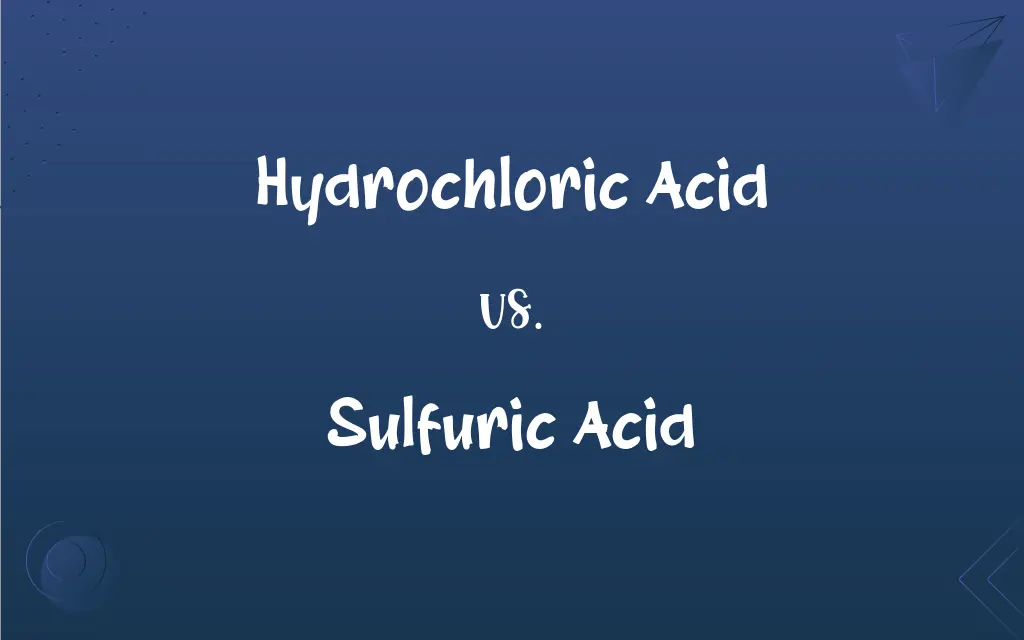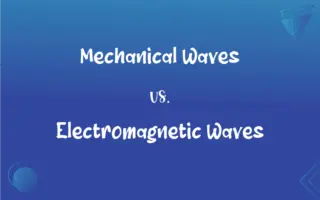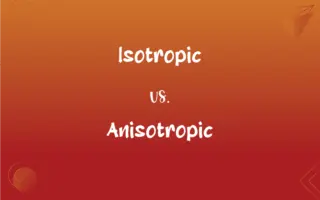Hydrochloric Acid vs. Sulfuric Acid: What's the Difference?
Edited by Aimie Carlson || By Harlon Moss || Updated on October 15, 2023
Hydrochloric acid (HCl) is a strong acid derived from hydrogen chloride in water, while sulfuric acid (H₂SO₄) is a highly corrosive strong acid made from sulfur, oxygen, and hydrogen.

Key Differences
Hydrochloric acid, with the chemical formula HCl, is a clear, colorless solution of hydrogen chloride in water. Sulfuric acid, represented as H₂SO₄, is a thick, oily liquid that is colorless to dark brown, depending on its purity and concentration.
While hydrochloric acid is primarily produced in the stomach to aid in digestion, it also has industrial applications such as metal pickling and pH regulation. Sulfuric acid, on the other hand, is predominantly used in the manufacture of fertilizers, detergents, and dyes.
Both hydrochloric acid and sulfuric acid are classified as strong acids, meaning they dissociate completely in water. However, sulfuric acid is diprotic, meaning it can donate two protons (hydrogen ions), whereas hydrochloric acid is monoprotic and donates only one.
Safety precautions are crucial when handling either acid. Hydrochloric acid can produce harmful fumes, and its exposure can cause respiratory issues. Sulfuric acid, being highly corrosive, can cause severe skin burns and poses a threat if inhaled or ingested.
In terms of environmental concerns, releases of hydrochloric acid can acidify bodies of water. Sulfuric acid, when airborne, can lead to acid rain, which harms aquatic life, vegetation, and infrastructure.
ADVERTISEMENT
Comparison Chart
Chemical Formula
HCl
H₂SO₄
Appearance
Clear, colorless solution
Colorless to dark brown thick, oily liquid
Proticity
Monoprotic (donates one proton)
Diprotic (donates two protons)
Primary Natural Source
Stomach (digestion aid)
Not naturally found in significant concentrations
Major Industrial Use
Metal pickling, pH regulation
Fertilizer, detergent, dye production
ADVERTISEMENT
Hydrochloric Acid and Sulfuric Acid Definitions
Hydrochloric Acid
Hydrochloric acid is a clear, colorless solution of hydrogen chloride in water.
The laboratory stored hydrochloric acid in a labeled container.
Sulfuric Acid
Direct exposure can cause severe burns and other health issues.
Safety goggles are essential when working with sulfuric acid.
Hydrochloric Acid
It is a strong acid commonly used in industrial processes.
Hydrochloric acid was used to clean the metal surfaces.
Sulfuric Acid
It's a major industrial acid used in various manufacturing processes.
Sulfuric acid played a key role in the production of the fertilizer.
Hydrochloric Acid
In high concentrations, it can be corrosive and hazardous.
Care was taken to avoid skin contact with hydrochloric acid.
Sulfuric Acid
It's a thick, oily liquid that can range from colorless to brown.
The concentrated sulfuric acid was carefully poured from its dark bottle.
Hydrochloric Acid
Hydrochloric acid has a pungent, irritating odor.
The spilled hydrochloric acid gave off strong fumes.
Sulfuric Acid
Sulfuric acid is diprotic, meaning it can release two protons.
The scientist noted the diprotic nature of sulfuric acid during titration.
Hydrochloric Acid
Hydrochloric acid is naturally produced in the stomach to aid digestion.
Excess hydrochloric acid can lead to heartburn.
Sulfuric Acid
Sulfuric acid is a highly corrosive strong acid with the formula H₂SO₄.
The battery contained dilute sulfuric acid as an electrolyte.
FAQs
What is the chemical formula for hydrochloric acid?
The chemical formula for hydrochloric acid is HCl.
Is hydrochloric acid naturally found in our body?
Yes, hydrochloric acid is produced in the stomach to aid in digestion.
How is sulfuric acid represented chemically?
Sulfuric acid is represented as H₂SO₄.
How should one handle hydrochloric acid safely?
It should be handled with gloves, goggles, and in well-ventilated areas.
Can hydrochloric acid and sulfuric acid be mixed?
While they can be mixed, it's important to follow safety protocols due to the exothermic reaction and potential hazards.
What are common uses for sulfuric acid?
Sulfuric acid is used in producing fertilizers, detergents, and dyes.
Does sulfuric acid have a role in battery production?
Yes, sulfuric acid is used as an electrolyte in lead-acid batteries.
Is hydrochloric acid considered a strong acid?
Yes, hydrochloric acid is classified as a strong acid.
What is the pH of concentrated hydrochloric acid?
The pH of concentrated hydrochloric acid is typically around 0.
Can hydrochloric acid be harmful?
Yes, in high concentrations, hydrochloric acid can be corrosive and harmful.
How dangerous is sulfuric acid?
Sulfuric acid is highly corrosive and can cause severe burns upon contact.
Is hydrochloric acid used in metal cleaning?
Yes, hydrochloric acid is used in metal pickling to clean metal surfaces.
How many protons can sulfuric acid donate?
Sulfuric acid is diprotic and can donate two protons.
What precautions are necessary when working with sulfuric acid?
Wear protective equipment, avoid inhalation, and work in well-ventilated spaces.
Can sulfuric acid contribute to acid rain?
Yes, airborne sulfuric acid can lead to acid rain formation.
What color is hydrochloric acid?
Hydrochloric acid is a clear, colorless solution.
Is it safe to store sulfuric acid in glass containers?
Yes, sulfuric acid can be stored in glass containers, but it should be handled with care.
In what state is sulfuric acid at room temperature?
Sulfuric acid is a liquid at room temperature.
Does hydrochloric acid have a strong odor?
Yes, hydrochloric acid has a pungent, irritating odor.
Are both hydrochloric acid and sulfuric acid soluble in water?
Yes, both acids are highly soluble in water.
About Author
Written by
Harlon MossHarlon is a seasoned quality moderator and accomplished content writer for Difference Wiki. An alumnus of the prestigious University of California, he earned his degree in Computer Science. Leveraging his academic background, Harlon brings a meticulous and informed perspective to his work, ensuring content accuracy and excellence.
Edited by
Aimie CarlsonAimie Carlson, holding a master's degree in English literature, is a fervent English language enthusiast. She lends her writing talents to Difference Wiki, a prominent website that specializes in comparisons, offering readers insightful analyses that both captivate and inform.































































